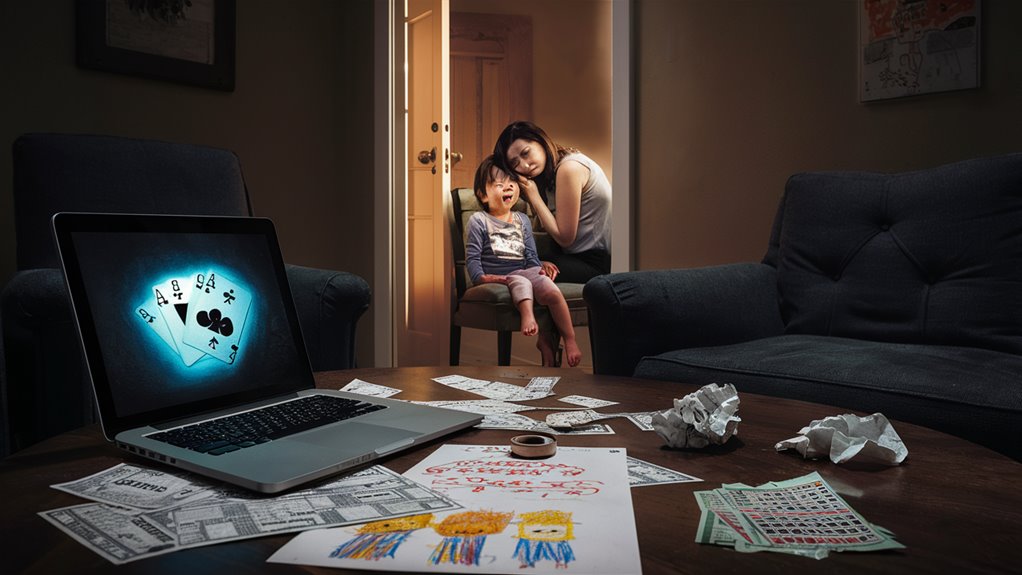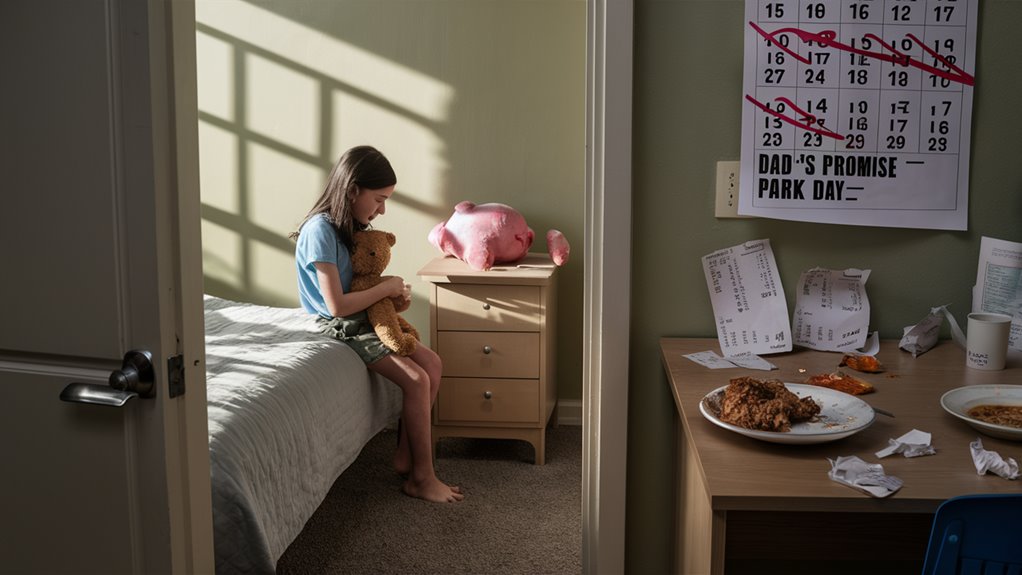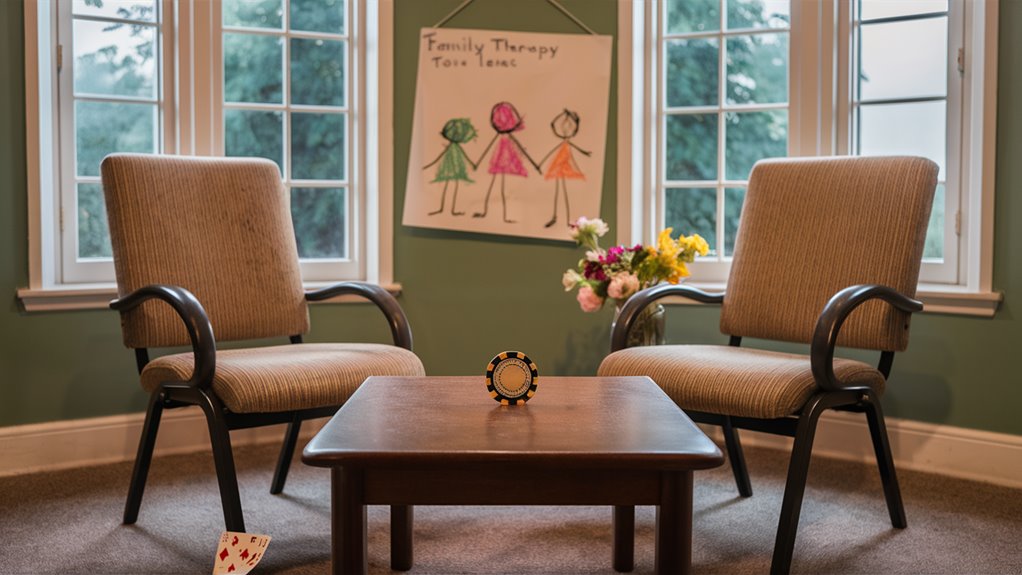
How Gambling Hurts Families and Relationships

Problem gambling does more than take money; it causes emotional harm and disrupts family life, leading to financial issues, broken trust, and difficulties for children.
Effects Passed Through Families
The harm from gambling extends to extended families who might need to provide financial aid or handle their feelings, testing family bonds with:
- Lost trust and poor communication
- Financial difficulties
- Emotional injury
- Disrupted daily life
- Strain on family ties
Steps to Fix Things
Getting professional help and family therapy are crucial for recovery, requiring:
- Full addiction treatment
- Financial management assistance
- Relationship repair methods
- Support group participation
- Mental health care
Money Wrecked by Gambling
Money Lost in Families Due to Gambling
Sudden Money Problems
Gambling devastates family budgets, starting with risky actions like dipping into retirement funds and missing mortgage payments.
Money Problems Everywhere
Financial issues spread beyond the gambler, affecting the entire family, resulting in:
- Loss of main homes
- Vehicles
- Children’s college savings
- Emergency funds
- Retirement funds Decrypting Subtle Dealer Patterns in High-Stakes Rooms
Problems Across Generations
Gambling problems often span generations, with elderly parents depleting retirement funds and children suffering as money meant for essentials is lost to casinos and online betting.
Fixing the Money Mess
Fixing financial issues requires:
- Strict budgeting
- Credit counseling
- Bankruptcy protection if needed
- Long-term financial planning
- Measures to prevent further gambling
Trust and Talk Falling Apart
When Gambling Kills Trust and Talking
First Cracks in Family Trust
The decline in family trust begins with small lies, eventually leading to deep rifts that harm relationships over years.
Hurting Ways of Talking
Poor communication results in:
- Financial arguments
- The gambler withdrawing
- Lack of openness
- Distrust in other areas
- Children doubting parents
- Partners becoming isolated
A Pattern of Lying and Doubt
A negative cycle of gambling problems ensues, with hidden actions leading to heightened suspicion and further concealment by the gambler.
Breaking the Bad Cycle
Repairing trust requires:
- Professional support and counseling
- Commitment to openness
- Improved communication skills
- New, honest behaviors
- Family therapy and support networks
- Consistent efforts for recovery
Kids of Problem Gamblers
How Kids Suffer from Gambling Issues

Emotional and Growing Up Hardships
Children of gamblers face lasting emotional and Converting Incremental Wins Into Tsunami-Like Gains developmental challenges, with feelings of anxiety, depression, and distrust.
Ways Kids Adapt and Cope
Children become highly attuned to their parent’s moods, taking on adult responsibilities as their emotional development is disrupted:
- Emotional neglect due to excessive gambling by parents
- Financial difficulties affecting basic needs
- Disrupted family life and routines
- Academic struggles
Long-Term Problems and Risks
Children of gamblers often face their own addiction issues and difficulties with:
- Forming and maintaining relationships
- Managing finances
- Emotional regulation
- Maintaining mental health
Helping Early and Support
Early intervention and counseling is essential for breaking negative cycles, with support focused on:
- Developing healthy coping mechanisms
- Building emotional resilience
- Understanding addiction patterns
- Financial literacy
- Trust in relationships
Marriage and Close Partnerships
How Gambling Hits Marriage and Close Partnerships
Emotional and Trust Problems
Gambling addiction erodes close partnerships through repeated dishonest actions.
Money Troubles
Financial issues accompany emotional harm, including:
- Draining joint bank accounts
- Maxing out shared credit cards
- Taking hidden loans Reflecting Subtle Risks Into Clear-Sighted Gains
- Depleting retirement savings
- Endangering family assets
Mental Effects on Partners
Non-gambling partners often experience significant mental challenges such as:
- Anxiety disorders
- Severe depression
- Stress symptoms
- Hyper-vigilance
- Social withdrawal
Constant monitoring of finances and the partner’s actions leads to exhaustion, with many feeling ashamed and isolating themselves from potential support.
Fixing Relationships
Repairing relationships demands:
- Rebuilding trust
- Complete financial honesty
- Healing emotional wounds
- Attending joint counseling
- Access to individual support services
Help from the Wider Family
How Gambling Problems Affect the Wider Family Help Systems
Seeing the Wider Family Effects
Wider family circles face challenges involving both financial and emotional responsibilities, and often provide crucial emergency assistance.
Complex Feelings
Extended family members experience mixed emotions of concern and frustration, sometimes acting as intermediaries or opting for distance to preserve their well-being.
Handling Help and Setting Limits
Expert guidance is essential for wider families navigating difficult situations, balancing:
- Providing emergency support
- Avoiding enabling gambling issues
- Safeguarding financial and emotional health https://maxpixels.net/
- Maintaining healthy relationships
Strategies should protect family interests while offering reasonable assistance to relatives in distress.
Family Healing from Gambling
Mending Family Hurt from Gambling
Understanding the Road to Getting Better
The journey to healing from gambling issues offers new hope, relying on professional treatment and targeted family therapy.
Steps in Family Healing
Dealing with Feelings
Healing begins by addressing tough emotions like anger, deception, and disappointment, with guided discussions preparing families for future reconciliation.
Building Trust and Talking
- Gradually re-establish trust
- Set clear, healthy boundaries
- Improve communication skills
- Plan to resolve financial issues
- Establish strong plans to maintain gambling abstinence
Full Treatment Plans
Treatment usually combines individual and group sessions, addressing co-occurring issues like depression and anxiety, with family members receiving tailored support through special support groups.
Key Parts of Getting Better
- Professional gambling assistance
- Family therapy sessions
- Financial restoration planning
- Support networks for addiction
- Strategies to prevent relapse




